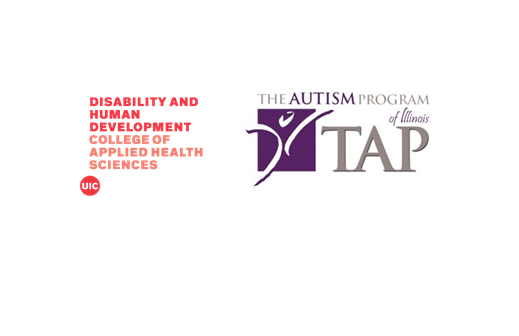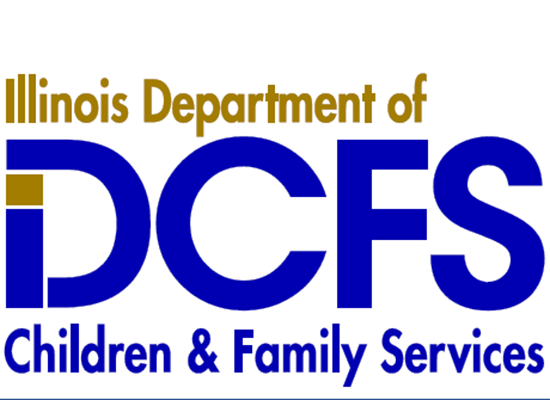Autism Webinar Series

Learn from experts in the field about assistive technology, post-transition, behavior planning and early detection and intervention.
The University of Illinois at Chicago’s Institute on Disability and Human Development and The Autism Program of Illinois (TAP) are kicking off a series of webinars in honor of Autism Awareness Month.
The webinars will discuss many aspects of autism, including interventions and strategies to improve quality of life and important information on the systems that affect individuals with autism spectrum disorder.
The webinars will feature experts from across the field. Continuing education units will also be available for all webinars.
To register, visit www.accessibilityonline.org/IDHD.
Schedule details are available below by topic:
Assistive Technology Series
- April 10, 1-2 p.m.
“AT Tools for Independence – Electronic Aids to Daily Living” - April 29, 1-2 p.m.
“AT Communication Tools and Strategies” - May 9, 1-2 p.m.
“AT Tools and Resources for Latinx Families” - May 16, 1-1:30 p.m.
“AT Creating Individualized Communication Profiles”
(.5 continuing education units available only in conjunction with one other ATU webinar)
Post-Transition
- April 11, 1-2 p.m.
“Accessing Adult Services in Illinois” - May 23, 1-2 p.m.
“What Happens after High School? Transition to College for Autistic and Disabled Youth” - May 30, 1-2 p.m.
“ABLE Accounts”
Behavior Planning
- April 18, 2-3 p.m.
“Understanding and Improving Behavior: A Sensible Approach” - June 20, 1-2 p.m.
“ABA Basics: Recognizing Good and Bad Behavior Plans”
Early Detection and Intervention
- June 13, 1-2 p.m.
“Early Detection of Autism” - June 27, 1-2 p.m.
“A Look at Alternative Interventions”
Questions? Please contact Susan Kahan at skahan@uic.edu.
Sensory-Friendly Bunny Visits

Free Easter Bunny visits for people of all ages and abilities.
Individuals with special needs and their families are invited to sensory-friendly Easter Bunny photo sessions scheduled throughout Illinois.
Autism Speaks is partnering with Cherry Hill Programs this spring to provide the special events.
The Bunny will welcome people of all ages and abilities at several locations across Illinois. The visits will take place in a more subdued and calm environment with extra effort to support visitors’ sensory, physical and developmental needs.
The Bunny Experiences are free, and photos will be available for purchase at each event.
The Illinois Bunny visits are scheduled for the following cities and dates:
- Aurora, April 7
- Bourbonnais, April 7
- Calumet City, April 14
- Chicago Ridge, April 7
- Fairview Heights, April 7
- Gurnee, April 7
- Joliet, April 7
- Lincolnwood, April 7
- Lombard, April 7
- Orland Park, April 7
- Peoria, April 7
- Schaumburg, March 31 and April 7
- Springfield, April 7
- West Dundee, April 7
Reservations are limited. Visit the Autism Speaks website for the full list and to reserve your spot.
For more family-friendly spring activities for children with special healthcare needs, be sure to check out our Events page.
Focus Group: Share Your Insight About Early Intervention

Families of young children with disabilities are invited to participate.
The Early Intervention Clearinghouse (EIC) at the University of Illinois at Urbana-Champaign is conducting focus groups with families of young children with disabilities. The purpose is to learn their perspectives about needed supports, information and services.
Participants must be the parent or family member of a young (age birth to 8 years old) child who received Early Intervention services.
The focus groups will be held at four different locations:
- Chicago – Family Resource Center on Disabilities, 11 E. Adams St. Suite 1002, on March 22 at 10:30 a.m.
- Normal – Eastview Christian Church, 1500 N. Airport Road, on March 29 at 5:30 p.m.
- Grayslake – Therapeutic Links, 998 Progress Drive, on April 6 at 10 a.m.
- Villa Park – Easterseals DuPage & Fox Valley, 830 S. Addison Ave., on April 10 at 7 p.m.
For more information and to participate, please contact Meghan Burke at (217) 300-1226 or meghanbm@illinois.edu.
Job Opportunities for Chicago Teens and Adults with Disabilities

Illinois DCFS and Goodwill Great Lakes are connecting current and former DCFS youth with full- and part-time jobs.
The Illinois Department of Children and Family Services (DCFS) is partnering with Goodwill Great Lakes Food Services to provide job opportunities to current and former disabled youth in care.
Teenagers and adults will have the opportunity to learn new skills and earn a good wage while making a difference.
To be eligible for an interview, you must be:
- 17 years old or older
- A current or former youth in care with DCFS
- Currently disabled
- A resident of the Chicago metropolitan area
Low-cost shuttle service is available from designated locations in Chicago and Skokie. Free shuttle service is available from the Great Lakes Metra Station.
Please contact Corey Shannon at (312) 405-0491 or corey.shannon@illinois.gov for more information and next steps for setting up an interview.
Also note that The AbilityOne Program requires disability verification from the youth’s caseworker to determine an individual’s eligibility.
A case worker will need to accompany applicants to the interview.
Below are tips to prepare for the interview:
- Dress appropriately
- Be on time
- Show willingness to learn a new skill
Free Financial Literacy Workshops in Springfield

Adults and youth ages 14 and older can learn from area banking professionals.
Managing money is an important skill to help us reach our goals and dreams.
The Sangamon County Department of Community Resources is hosting free financial literacy workshops every Wednesday of the month.
The workshops are for adults and youth ages 14 and older. They will be held from 9 a.m. to 12 p.m. at the Public Health Community Services Building at 2833 South Grand Ave. East in Springfield.
Participants will learn ways to live within their means and manage debt so it doesn’t manage you.
You will also learn how to develop a spending plan that will help you reach your goals. Area banking professionals will also show you how to manage expenses if you have children and other tips on deductions you may be able to take on your taxes.
Registration is required. Call (217) 535-3120.
Reel Movies for Real Needs

Marcus Theatres’ offers sensory-friendly showings for families with special needs.
Marcus Theatres Reel Movies for Real Needs is a specially designed program to serve families with special needs who seldom attend movies. It provides a welcoming and comfortable environment with lower sound and lights up so special needs families can share the experience of seeing family-friendly films at a theater.
Upcoming Reel Movies for Real Needs include:
- Spider-Man: into the Spiderverse – Dec. 15
- Aquaman – Dec. 22
- Mary Poppins Returns – Dec. 29
- Bumblebee – Jan. 5
- A Dog’s Way Home – Jan. 12
- The Kid Who Would be King – Jan. 26
A select first run movie is featured one Saturday each month at 10:30 a.m. Visit the Reel Movies for Real Needs website for location and ticket information.
Reel Movies for Real Needs is available at the following Illinois theaters:
- Addison Cinema
1555 West Lake Street
Addison, IL 60101 - Bloomington Cinema + IMAX
1111 Wylie Drive
Bloomington, IL 61705 - Orland Park Cinema
16350 South LaGrange Road
Orland Park, IL 60467
For questions, please call (800) 274-0099, ext. 1.
Sensory-Friendly Santa Stops from Autism Speaks

Free Santa Experiences welcome children of all ages and abilities!
Autism Speaks is once again partnering with Cherry Hill Programs this holiday season to provide free, sensory-friendly Santa Experiences for families across the country.
All families of children with autism and other special needs can enjoy a visit with Santa in a more subdued and calm environment.
Santa stops in Illinois begin Dec. 2 and are scheduled for communities including:
- Aurora
- Chicago Ridge
- Fairview Heights
- Gurnee
- Joliet
- Lincolnwood
- Lombard
- Orland Park
- Peoria
- Schaumburg
- South Barrington
- Springfield
- Rockford
- West Dundee
Go to the Autism Speaks website for the full list of Cherry Hill Programs Santa Photo Experiences in Illinois and to reserve your spot.
Sensory-friendly Santa events are free and keepsake photo packages will be available for purchase.
For more Santa visits and other Christmas-related events for children with special healthcare needs in Illinois, be sure to check our Events page.
Options for Voters with Disabilities

Learn more about your rights and options with USAGov’s Guide for Voters with a Disability.
Election Day is right around the corner. Do you know if your polling place is accessible? Do you need accommodations?
USAGov has developed a step-by-step guide to help you plan accordingly and know your rights before heading to the polls.
The Guide for Voters with a Disability provides helpful suggestions, including calling your local elections office in advance to find out what accessible accommodations are available at your polling place.
You can also go to Vote.gov to register to vote or check if your registration is up-to-date
Free Mammograms in Central Illinois Through October

Mammogram Mondays provide free screening mammograms for uninsured and under-insured women age 40 and older.
It’s important that mothers and female caregivers of children with special needs take care of their own health and wellness.
The Regional Cancer Partnership of Illinois, with funding provided by the Memorial Affiliate of Susan G. Komen, is sponsoring free screening mammograms on Mondays in October.
Mammogram Mondays are for women ages 40 and over who are uninsured or under-insured. They are scheduled for Oct. 1, 8, 15, 22 and 29 at the following locations:
- St. John’s Women’s Center, S. Sixth St., Springfield
For appointments from 8 to 11 a.m. or 1 to 4 p.m., call St. John’s at (217) 757-6400, ext. 3. - Baylis Breast Center, 747 N. Rutledge, Springfield
For appointments beginning at 4 p.m., call Memorial’s Mammography at (217) 788-4042. - Abraham Lincoln Memorial Hospital, 200 Stahlhut Drive, Lincoln
To schedule an appointment, call (217) 605-5108. - Taylorville Memorial Hospital, 201 E. Pleasant St., Taylorville
To schedule an appointment, call (217) 824-1865. - Hillsboro Area Hospital, 1200 E. Tremont St., Hillsboro
To schedule an appointment, call (217) 532-4196.
Tips to Avoid Heat-Related Illnesses

Learn the signs of heat-related illnesses and how to prevent them.
A predicted heat wave for most of the state could bring a dangerous mix of high temperatures and high humidity.
Illinois Department of Public Health (IDPH) Director Nirav D. Shah, M.D. is reminding people about the importance of staying cool in order to avoid heat-related illnesses like heat exhaustion and heat stroke.
“Hot weather can cause heat-related illness which ranges in severity from relatively mild heat cramps to life-threatening heat stroke. It’s important for people to recognize the signs of heat-related illness and take action to prevent becoming sick,” said Director Shah. “Normally, the body cools itself by sweating. However, if temperatures and humidity are extremely high, sweating is not effective in maintaining the body’s normal temperature. If the body does not cool properly or does not cool enough, a person may suffer a heat-related illness, which can become serious or even deadly.”
IDPH has put together an easy-to-read chart of heat-related illnesses, what to look for, and what to do. You can access it at IDPH Heat Safety Tips.
Heat-related death or illnesses are preventable if you follow a few simple steps.
- Stay in an air-conditioned area during the hottest hours of the day. If you don’t have air conditioning in your home, go to a public place such as a shopping mall or a library to stay cool. Cooling stations and senior centers are also available in many large cities for people of all ages. To find cooling centers in state facilities, visit https://www2.illinois.gov/sites/KeepCool/SitePages/CoolingCenters.aspx.
- Wear light, loose-fitting clothing.
- Drink water often. Don’t wait until you are thirsty.
- Avoid unnecessary hard work or activities if you are outside or in a building without air-conditioning.
Air conditioning is the strongest protective factor against heat-related illness. Exposure to air conditioning for even a few hours a day will reduce the risk for heat-related illness.
Never leave anyone, including pets, alone in a closed, parked vehicle. The air temperature inside a car rises rapidly during hot weather and can lead to brain damage or death.
Visit the IDPH website for more heat-related information.


